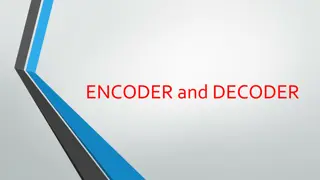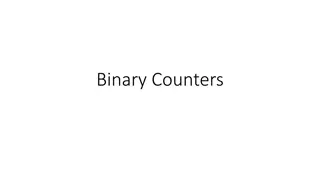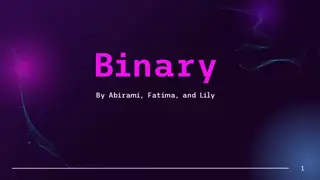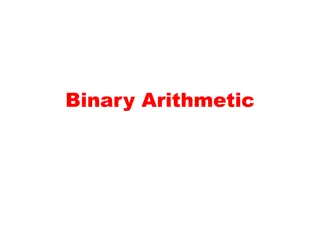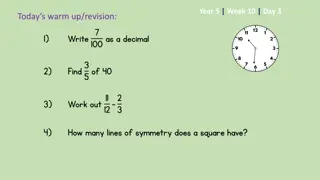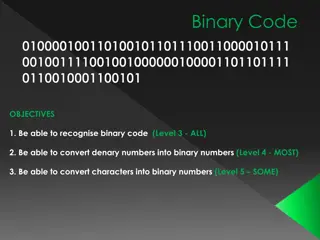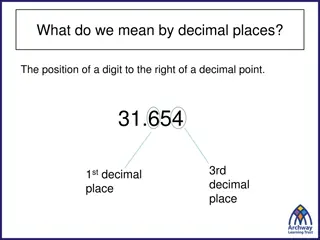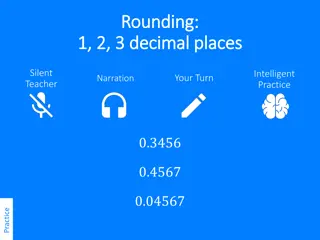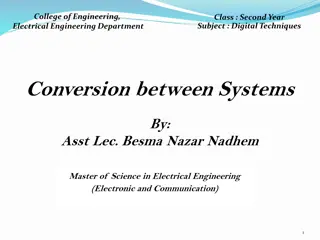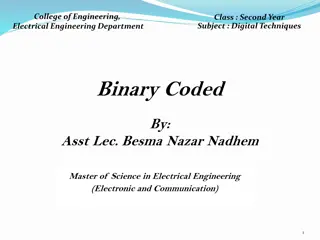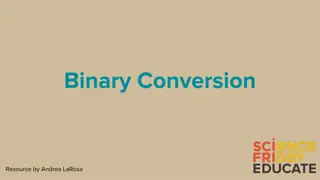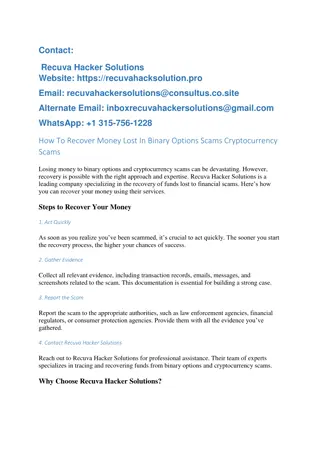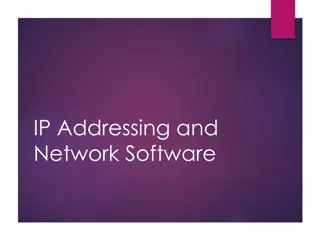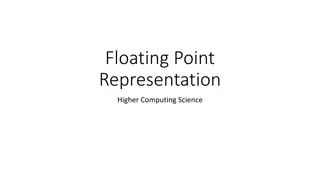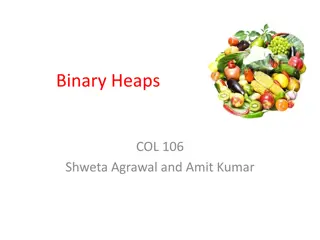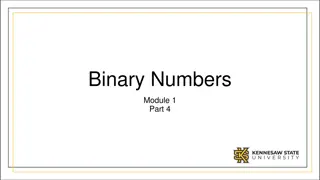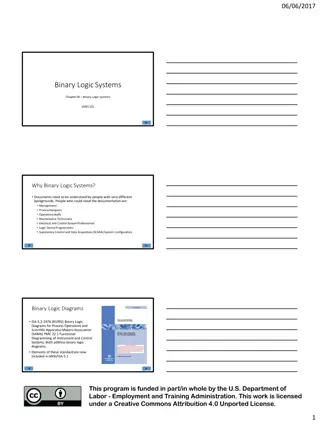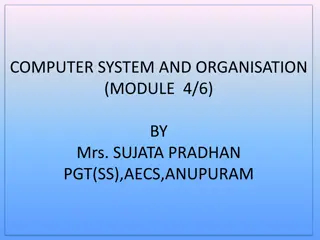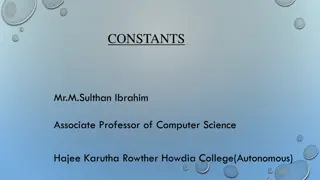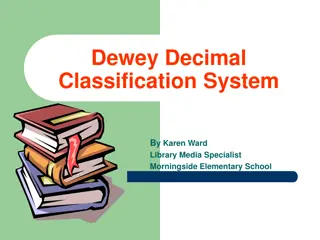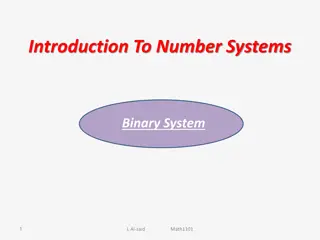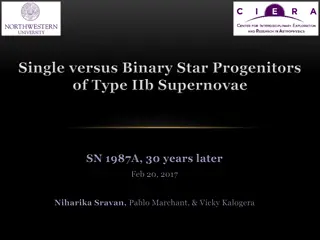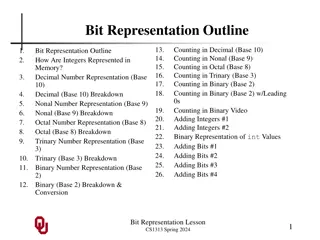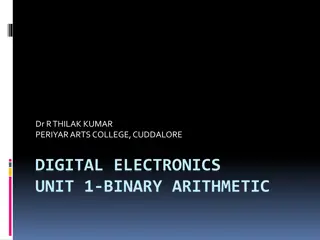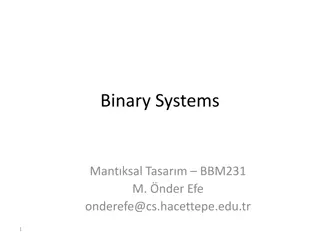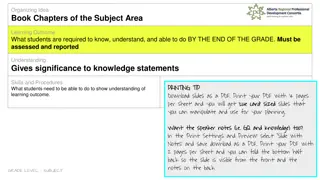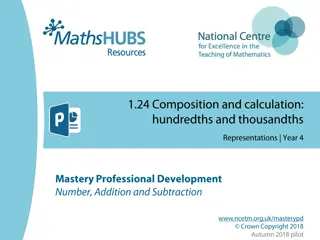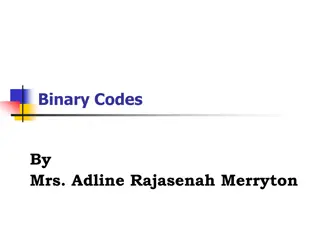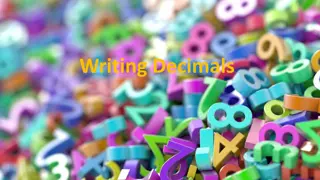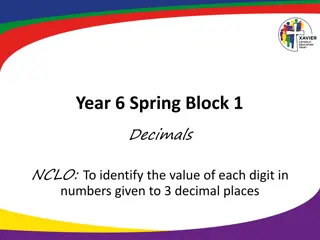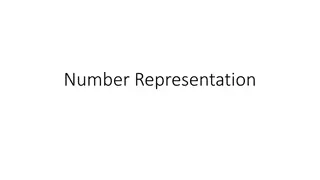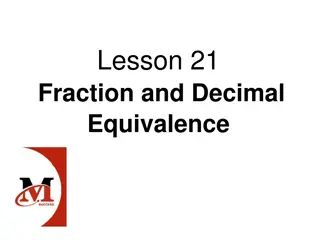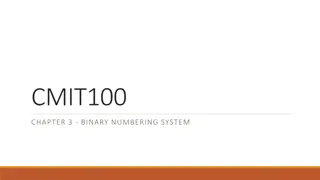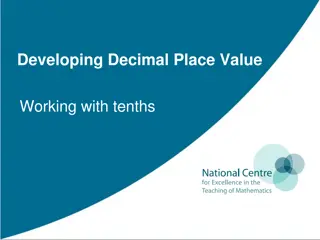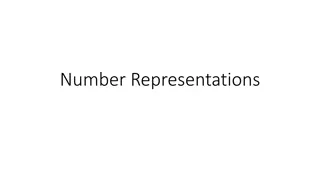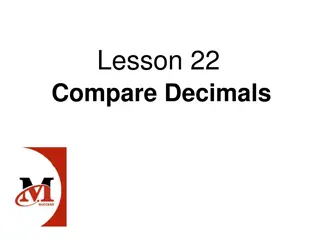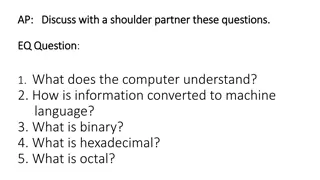Understanding Binary Codes and Their Applications
Binary coding is crucial for digital systems as they understand only 0s and 1s. This process converts information into binary language for processing by digital circuits. Different types of binary codes like weighted codes and BCD codes are used for error correction, digital communication, and compu
7 views • 20 slides
Understanding Encoder and Decoder in Combinational Logic Circuits
In the world of digital systems, encoders and decoders play a crucial role in converting incoming information into appropriate binary forms for processing and output. Encoders transform data into binary codes suitable for display, while decoders ensure that binary data is correctly interpreted and u
4 views • 18 slides
Understanding Binary Counters and Types of Counters
Binary counters are registers used to count clock pulses, while binary counters follow the binary number sequence. There are two types of counters: serial/asynchronous counters and parallel/synchronous counters. Serial counters change output flip-flop to next flip-flop, requiring minimal hardware bu
12 views • 21 slides
Understanding Non-Weighted Codes and Excess-3 Code in Binary Systems
Explore non-weighted binary codes like Excess-3 code, learn how to convert decimal numbers to XS-3 code, advantages and disadvantages of BCD codes, and steps to convert Excess-3 code to binary. Discover the intricacies of binary coding systems with practical examples.
5 views • 55 slides
Understanding Binary Number System and its Applications
Explore the world of binary numbers with insights on what binary is, its significance in computing, conversion methods between binary and decimal, hexadecimal number system, and binary arithmetic operations. Dive into the foundations of digital communication through the language of zeros and ones.
0 views • 24 slides
Binary Arithmetic
Explore the world of binary arithmetic, including addition, subtraction, multiplication, and division. Learn the rules and examples of performing basic binary operations efficiently. Understand how to convert binary numbers to decimal equivalents. Enhance your understanding with visual explanations
0 views • 51 slides
Understanding Thousandths as Decimals: Exploring Decimal Place Values
Delve into the concept of understanding thousandths as decimals by exploring decimal place values through informative images and exercises. Learn to represent and write numbers with precision up to three decimal places, enhancing your math skills in a structured manner.
1 views • 21 slides
Understanding Binary Code and its Conversion
Computers rely on binary code, consisting of 0s and 1s, to communicate. Learn how to recognize, convert denary numbers to binary, and understand the basics of the computer language. Discover how to create a table for conversion and practice converting numbers to binary in this informative guide.
1 views • 26 slides
Understanding Decimal Places and Rounding
Decimal places refer to the position of a digit to the right of a decimal point. Rounding numbers to a specific decimal place involves looking at the digit immediately to the right of the desired decimal place and adjusting the number accordingly. This process helps simplify numbers for easier under
1 views • 14 slides
Mastering Decimal Rounding with Intelligent Practice
Enhance your rounding skills with this interactive guide on rounding decimal numbers to 1, 2, and 3 decimal places. Practice with silent teacher narration and work through examples to perfect your technique. Explore worked examples and test your understanding.
1 views • 4 slides
Understanding Binary Codes and Self-Complementing Codes
The concept of binary codes, including Binary Coded Decimal (BCD) codes, and self-complementing codes is explored in this informative content. Learn about how decimal numbers are represented in binary form, the structure of BCD codes, and the properties of self-complementing codes like 2421 and Exce
2 views • 34 slides
Digital Techniques for Number System Conversion in Electrical Engineering
Understand how to convert between binary, octal, decimal, and hexadecimal number systems with examples and explanations. Learn the processes of binary-to-decimal, octal-to-decimal, hexadecimal-to-decimal, decimal-to-binary, decimal-to-octal, and decimal-to-hexadecimal conversions. Gain insights into
0 views • 10 slides
Understanding Binary Coded Decimal (BCD) and Excess-3 Code
Binary Coded Decimal (BCD) is a binary code used to represent decimal numbers, with the popular 8421 BCD code and its conversion process explained. Additionally, Excess-3 Code, another BCD code, is detailed with an example of finding its code for a given decimal number. Different BCD codes like 4221
0 views • 11 slides
Understanding Binary Code and Color Conversion
Delve into the fascinating world of binary code and learn how it works to represent data digitally. Discover the process of decoding binary pulses into colored pixels, using binary sequences to identify colors, and practicing digital-analog conversion through logic maps. Explore the language of bina
0 views • 20 slides
Recover Lost Funds From Binary Options Fraud Brokers
Are you a victim of a binary options fraud? You can fight back and recover your funds. Report to MychargeBack today! We have helped thousand of binary options fraud victims to get their money back. You can get your funds back from binary options scam
0 views • 15 slides
Understanding IP Addressing and Conversion from Binary to Decimal
Learn about IP addressing, including binary notation, dotted-decimal notation, and the process of converting binary numbers to decimal. Explore the unique features of IP addresses and the steps involved in converting binary to decimal systematically.
4 views • 47 slides
Understanding Floating Point Representation in Binary Systems
In computer systems, decimal numbers are represented in memory using scientific notation. This involves moving the decimal point and using mantissa and exponent to maintain precision and range. The transition to representing numbers in binary involves multiplying by 2 to the power instead of 10. Uti
2 views • 22 slides
Understanding Binary Heaps: Efficient Data Structure for Priority Queue Operations
Explore the concept of binary heaps, a specialized type of binary tree that allows for quick retrieval of the smallest (or largest) element. Learn how binary heaps excel in finding the minimum value, essential for priority queue applications in operating systems, event simulations, and more. Compare
2 views • 34 slides
Understanding Binary and Decimal Number Systems
This content explores the basics of binary and decimal number systems in a simple and engaging manner. It starts with decimal numbers, explaining how our numbering system works and progresses to binary numbers, which have only 2 digits (0 and 1). The significance of these systems in computing and ho
0 views • 27 slides
Understanding Binary Logic Systems in Documentation
Binary logic systems play a crucial role in documentation for individuals with diverse backgrounds such as management, process designers, operations staff, maintenance technicians, and more. These systems, depicted in binary logic diagrams, provide a clear and concise representation for various prof
4 views • 16 slides
Understanding Number Systems and Conversions in Computer Systems
Explore the fundamentals of number systems in computer science, including decimal, binary, octal, and hexadecimal. Learn conversion methods between different bases and practical examples like converting decimal to binary. Dive into octal-binary conversions with solved problems. Enhance your knowledg
1 views • 16 slides
Understanding Different Types of Constants in Programming
Constants in programming are fixed values that do not change during program execution. They include character, numerical, and string constants. Integer constants can be decimal, octal, or hexadecimal. This article explains each type of constant with examples of decimal, octal, and hexadecimal intege
0 views • 22 slides
Unlocking the Dewey Decimal Classification System
Explore the fascinating world of the Dewey Decimal Classification System created by Melvil Dewey. Discover the ten main classifications that categorize the vast realm of knowledge, from generalities to natural sciences. Learn how to identify books using Dewey Decimal call numbers and delve into vari
0 views • 19 slides
Exploring the Binary Number System in Mathematics
Delve into the intricacies of the binary number system with this comprehensive guide. Learn how binary numbers are formed, and master the conversion techniques between binary and decimal numbers. Discover the fascinating world of binary fractions and the algorithms for converting decimal numbers to
0 views • 20 slides
Unveiling the Progenitors of Stripped Envelope Supernovae (SNe)
The mechanism behind the stripping of stripped-envelope SNe remains a key question linked to their progenitors. Various mechanisms such as Single Star Progenitors, Binary Star Progenitors, Stellar Winds, and Close Binary Interactions are thought to dominate the stripping process. Observations of Typ
0 views • 12 slides
Understanding Integer Representation in Computer Memory
Explore the binary representation of integers in computer memory, covering decimal, nonal, octal, trinary, and binary numbering systems. Learn how integers are stored using sequences of bits and decipher the breakdown of numbers in different bases. Discover the Arabic digits in decimal representatio
0 views • 26 slides
Introduction to Binary Arithmetic for Digital Electronics
Binary arithmetic is fundamental in digital electronics, involving addition, subtraction, and multiplication of binary numbers. This guide explains the rules and examples of binary arithmetic operations, such as binary addition and subtraction, along with detailed steps and illustrations for better
0 views • 21 slides
Understanding Binary and Numeric Systems in Computing
Delve into the world of binary systems, binary numbers, base conversions, powers of 2, arithmetic operations with binary and octal numbers, and multiplication principles in computing. Learn how to compute values and conversions in various number systems efficiently.
0 views • 41 slides
Understanding Decimal Numbers and Operations in Mathematics
This educational material focuses on teaching students in a structured manner about decimal numbers and operations within the subject of mathematics. It covers essential topics such as place value, addition, subtraction, prime and composite numbers, and more. Students are required to grasp the signi
0 views • 18 slides
Understanding Decimal Place Value with Visual Representations
Explore visual representations of decimal place value, from one-hundredths to thousands, to deepen your understanding of this important concept. Through a series of images, grasp the relation between units and fractions, moving from larger to smaller denominations. Enhance your knowledge of decimal
0 views • 50 slides
Understanding Binary Codes and Character Coding Techniques
Binary codes, such as ASCII and EBCDIC, are crucial in representing data in computers and digital systems. They play a key role in error detection and data encoding. This article discusses the basics of binary coding, various types of binary codes, character coding techniques like ASCII and EBCDIC,
0 views • 22 slides
Understanding Decimal Place Value through Visual Representation
Explore the concept of decimal place value with the help of interactive images showing numbers represented in a place value grid. Practice identifying numbers based on the value of tenths, hundredths, ones, and tens columns. Improve your understanding of decimals by visualizing and interpreting the
0 views • 16 slides
Understanding Decimals: Value Identification and Multiplication
This content focuses on identifying the value of each digit in numbers to 3 decimal places, understanding tenths and hundredths, using place value charts effectively, and multiplying numbers by 10, 100, and 1,000 in decimal form. It includes key vocabulary, questions, fluency exercises, and reasonin
0 views • 68 slides
Understanding Number Representation and Conversion
Learn how to convert between decimal and binary number representations. Discover the process from decimal to binary by dividing repeatedly by 2, and from binary to decimal by summing the powers of 2. Explore the simplicity of converting between base 16 and base 2, and practice binary addition with e
0 views • 27 slides
Understanding Fraction and Decimal Equivalence in Math
Discover how to express fractions with denominators of 10 as equivalent fractions with denominators of 100 in order to add them together. Learn to use decimal notation for fractions and explore essential questions on equivalent fractions, decimal conversion, and converting decimals to fractions. Eng
0 views • 58 slides
Understanding Binary Numbering Systems and Character Representation in Computing
Explore the world of numbering systems including decimal, binary, octal, and hexadecimal, and delve into how characters are stored in computer memory. Learn about Boolean operations and their application on binary numbers, with a focus on IP addresses. Discover the importance of ASCII, Unicode, and
0 views • 26 slides
Understanding Decimal Place Value with Tenths
This lesson focuses on developing a deep understanding of decimal place value specifically working with tenths. Key points include recognizing and using the unit '0.1,' understanding the role of the decimal point, visualizing quantities as decimals, and transitioning from additive to multiplicative
0 views • 38 slides
Understanding Binary Representation of Numbers with Fractions
Learn how to represent numbers with fractions in binary form. Discover the process of converting real numbers, like 5.75, into binary by separating the integer and fraction parts. Explore the method of obtaining the binary representation of the fraction through division by specific decimal values. U
0 views • 21 slides
Comparing Decimals with Examples and Practice Activities
Explore how to compare decimal numbers to the hundredths place using reasoning and visual representations. Practice identifying the larger decimal, understanding the importance of decimal places, and using symbols for comparison. Enhance your skills in comparing decimals through real-world scenarios
0 views • 32 slides
Understanding Binary Numbers and Computer Data Representation
A computer stores information digitally as binary numbers, where data is broken down into pieces and represented as numbers. The binary system uses 0s and 1s to encode information, with each bit representing on/off states. This system is crucial for converting data into machine language. Binary numb
0 views • 14 slides

